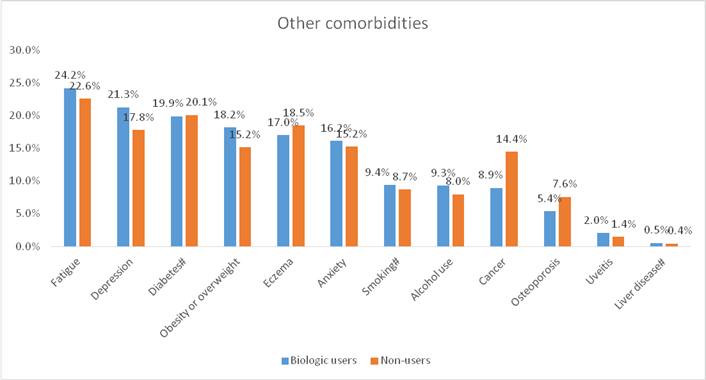Session Information
Date: Tuesday, November 15, 2016
Title: Spondylarthropathies and Psoriatic Arthritis – Clinical Aspects and Treatment - Poster III
Session Type: ACR Poster Session C
Session Time: 9:00AM-11:00AM
Background/Purpose:
Psoriatic Arthritis (PsA) are known to be at higher risk for numerous comorbid conditions. This study looks at the impact of biologic therapy by comparing comorbidities between PsA patients who have biologic therapy versus those who do not, using a large national claims database in the US.Methods:
Adults with ≥1 inpatient or 2 outpatient diagnoses of PsA (ICD-9-CM 696.0) in 1/1/2008 – 9/30/2015 were extracted from the MarketScan Commercial and Medicare Databases. Biologic users had ≥1 biologic claim on or after the first observed PsA diagnosis, and the index date was the first biologic claim date. Non-biologic users had no biologic claim anytime during the study period. Their index date was randomly assigned based on the distribution of the index dates of biologic users. All patients were required to have ≥12 months continuous enrollment prior to index date and were followed for ≥12 months until the earliest of inpatient death, end of continuous enrollment, or end of the data. The prevalence of comorbidities during the follow-up period was examined.Results:
A total of 9,369 biologic users and 11,774 non-users met the study criteria (mean age: 49.8 years for users vs. 55.1 for non-users; male: 45.8% vs. 43.8%; mean length of follow up: 3.0 vs. 3.0 years; mean Charlson comorbidity index: 0.6 vs. 0.8). Compared with non-users, biologic users had significantly higher rates of autoimmune disease, fatigue, depression, obesity or overweight, anxiety, alcohol use, and uveitis, but significantly lower rates of cardiovascular disease, eczema, cancer, and osteoporosis (Figure 1, p<0.05 in all cases). Figure 1. Prevalence Rates of Comorbidities in PsA Patients, by Biologic Therapy
# not significant (p>0.05).
Conclusion: PsA patients treated with biologics had higher rates of certain comorbidities, such as autoimmune diseases, fatigue, depression, obesity/overweight, and uveitis than those not on biologic therapy and lower rates of cardiovascular conditions, eczema, cancer, and osteoporosis. These results suggest use of biologics have an association with rates of certain comorbidities. Further studies looking at this topic could have an impact in treatment practice.
To cite this abstract in AMA style:
Kaine J, Song X, Kim G, Palmer J. Comparing Prevalence of Comorbidities in Patients with Psoriatic Arthritis By Biologic Therapy [abstract]. Arthritis Rheumatol. 2016; 68 (suppl 10). https://acrabstracts.org/abstract/comparing-prevalence-of-comorbidities-in-patients-with-psoriatic-arthritis-by-biologic-therapy/. Accessed .« Back to 2016 ACR/ARHP Annual Meeting
ACR Meeting Abstracts - https://acrabstracts.org/abstract/comparing-prevalence-of-comorbidities-in-patients-with-psoriatic-arthritis-by-biologic-therapy/


